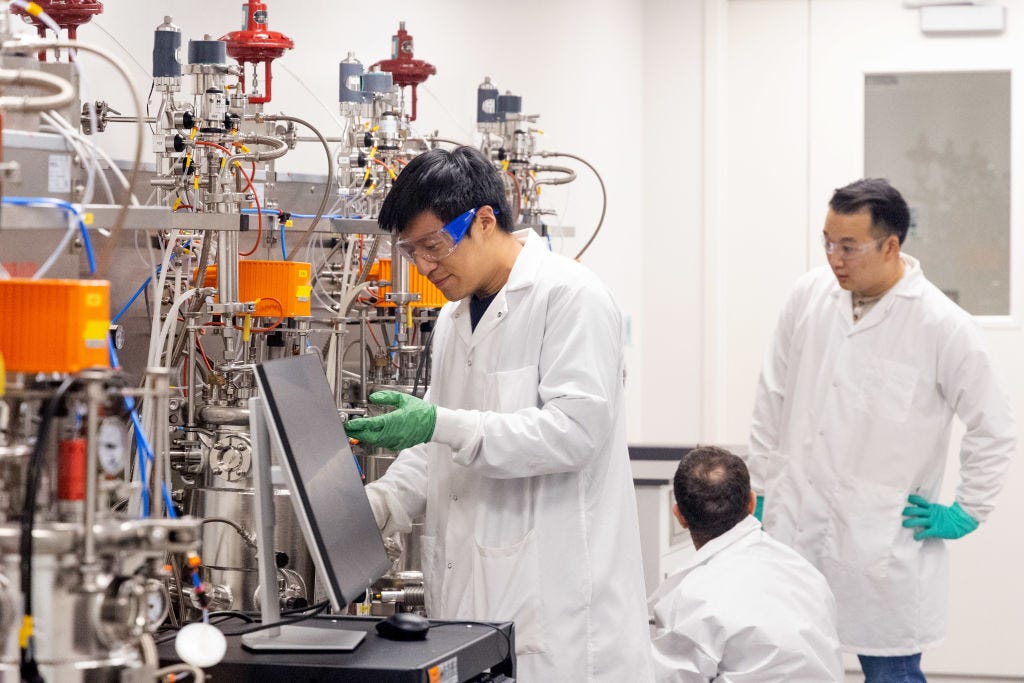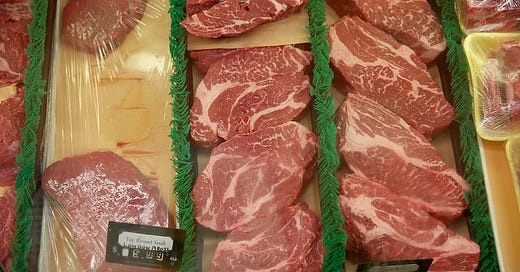
The Free Press

A version of this story originally appeared in Pirate Wires.
On March 6, the Florida House of Representatives passed legislation prohibiting the manufacture and sale of cultivated, or “lab-grown,” meat in Florida. Governor DeSantis is expected to sign the bill, and when he does, Florida will become the first state to ban cultivated meat, which is made by replicating the cells of real meat without the need to actually raise and slaughter the animal.
Other states, including Arizona, Kentucky, New Hampshire, Tennessee, and Alabama are considering similar bans. But what is the fight over cultivated meat really about? Is it economics, with one industry lobbying for protection from another? Is it the culture war, pitting red-blooded, carnivorous Americans against effete cosmopolitan environmentalists? Or is this truly a question of safety, as the state government, apparently in conflict with the FDA, has argued?
“The beef industry, specifically the Cattlemen’s Association, is behind this,” said Josh March, referring to the push to ban cultivated meat in Florida. March is the CEO of SciFi Foods, a start-up that produces cultivated beef. “It’s straight-up protectionism.”
It’s no secret that the Florida Cattlemen’s Association (FCA) has lobbied to ban cultivated meat in Florida, or that it has some influence in the state. Through its fittingly named “Florida Cow PAC,” the FCA gave $10K to another PAC in 2021 to conduct a fundraiser for the president of the Florida Senate. Since 2017, it has contributed $75,000 to Ron DeSantis, more than any other candidate, and has spent $72,000 on the Florida Republican Senatorial Campaign Committee during the same period. It has also maxed out campaign donations to Agriculture Commissioner Wilton Simpson and several state legislators who were instrumental in pushing the cultivated meat ban, including Danny Alvarez, Clay Yarborough, and Tyler Sirois.
Still, the maximum contributions are fairly low in Florida, at $3,000 for a statewide office and just $1,000 for legislative seats. Is this really enough to buy a party?
Supporters of the bill say protectionism has nothing to do with it. “Protecting them from what? A product that doesn’t exist yet?” said Florida State Representative Dean Black, a Republican from Jacksonville and supporter of the ban. When I asked why he thought the FCA had lobbied for the ban, he said, “They believe they have a product that is safe,” and noted that he was a fifth-generation Florida cattle rancher himself.
Josh March also comes from a farming family—his father owns a small herd of cattle in Scotland—and says that small-hold ranchers like his father don’t have much to fear from cultivated meat, at least for the foreseeable future. “Cultivated meat is still very early on in its development, and it will take many years to scale up production.” He pointed out that demand for meat was increasing all over the world, even as supply decreased in certain places—specifically, the American Midwest, where a drought last year wreaked havoc on the local beef industry. Companies like his, March argued, function to augment, rather than replace, the beef industry.
But given the U.S. national cattle herd has dwindled to its lowest point since 1951—something that happened without any cultivated beef products on the shelves—it seems the Cattlemen’s Association has bigger, more immediate problems than Midwestern droughts and as-yet largely hypothetical lab grown beef alternatives. Among them: a spike in production costs and increased global competition. Still, it’s not hard to imagine the Association might find the thought of further competition threatening, and why they’d rather argue on account of safety.
“We just want to make sure that a product is safe,” Rep. Black insisted when I spoke with him. “We shouldn’t be in a rush to fundamentally alter the human diet without first knowing the ramifications of it.” He added that when it comes to the “ongoing” field of human nutrition, ”we are still discovering things” and as far as cultivated meat goes, “there is no need to rush this to market.”
I pointed out that the FDA has already approved two different cultivated meat products, and asked who, if not the FDA, should determine whether or not cultivated meat products were safe. I didn’t get a clear answer.
“We are in uncharted territory,” Black said. “We’re taking natural food that humans evolved to eat and we’re trying to manufacture it ourselves from chemicals. We don’t know what’s gonna get left out. This is uncharted territory. Our institutions are not ready for this.”
Black pointed out that the “FDA has made mistakes before.”
The question of whether or not our regulatory institutions are “ready” for cultivated meat is an interesting one. There’s no federal law or final regulation that specifically addresses cultivated meat, and the current regulatory process itself is operating in a novel, ad hoc fashion. For example, the regulation of beef and chicken (the two proteins the cultivated meat industry is most interested in) is normally carried out solely under the auspices of the United States Department of Agriculture (USDA). However, cultivated meat is currently being regulated primarily by the FDA, with the USDA coming in only at the harvesting process to ensure proper labeling and sanitation requirements are met.
March, whose company is currently working its way through FDA approval, will have to wait until they’ve done a full review of the cell lines and any chemicals used throughout SciFi food’s process before they’ll issue a letter of approval, at which point the USDA can begin its process.
But with no legislation or concrete federal regulation governing cultivated meat, it’s unclear on what basis the FDA is making its decision. March told me that the two previous approvals, for Good Meat and Upside Foods, serve as something of a road map, but that the FDA has noted that the previous cases are not meant to serve as final guidance.

“As they learn more and get more information, they change their mind. So it can be a bit of a moving target,” March said. “The FDA is definitely cautious and conservative in their approach.”
The idea of food regulation standards being a “moving target” isn’t exactly reassuring, but setting regulations in stone for a nascent technology also seems unwise. One could take the FDA’s “moving target” as evidence that “our institutions are not prepared” for cultivated meat, as Rep. Black thinks, or evidence that our institutions are evolving along with it. So either the FDA is doing exactly what Florida legislators want it to do, or it’s not prepared to do anything at all, depending on your stance on cultivated meat.
Instead of deciding which it is, the Florida legislature rendered the question moot. But the heart of the (purported) issue is less about regulatory processes than the immortalized cells used to create the product.
“Until we have long-term studies that tell me what lab-grown immortalized cells do to your body, I challenge you to put it in your child,” said Florida State Representative Danny Alvarez, a co-sponsor of the bill banning cultivated meat.
March assured me that the immortalized animal cells used in meat cultivation “are very picky,” and that getting them to grow in a bioreactor under very precise conditions is a struggle. More to the point, whenever the cells are removed from the bioreactor, they die, and will not grow no matter how immortal they are. “Once they are cooked and dissolved by your stomach, they are just a collection of amino acids and DNA, same as if you ate any other cell.”
The safety of immortal cells in cultivated meat is what Bloomberg, in its reporting, called an “informal scientific consensus.” But as proponents of the Florida ban pointed out, there are no long-term studies.
With every company’s immortal cell line unique, lab-made, and patented, cultivated meat struck me as somewhat akin to GMOs, or genetically modified organisms, which have infiltrated the American diet from produce to cattle feed. But despite similarities, their political reception has been quite different.
For most of my life, opposition to GMOs has been a liberal issue, while the opposition to cultivated meat—at least in Florida—is being led by Republicans. In part, this might be a sign of the times; health-nuttery is more right-coded than it used to be, particularly online, and particularly after Covid, as is distrust of the FDA. But never mind all that. When it comes to the culture wars, cultivated meat’s biggest problem is that it assuages liberal neuroses in ways that annoy conservatives at best and make them paranoid at worst.
Liberals in The Washington Post openly yearning for a “guilt-free meat” future are suggesting, not so subtly, that eating meat in the present is immoral. From there, people imagine that sanctimonious liberal elites might one day force them to eat the “guilt-free meat”—in the pod, with a side of bugs. In this fever dream, slaughterhouses are shut down and turned into bike lanes for illegal-immigrant drag queens commuting to work at children’s libraries filled with neo-Marxist gay pornography. But it starts with your dinner.
Josh March admitted that vegan sanctimony had been unhelpful to the industry.
“The plant-based meat industry didn’t do itself, or the cultivated meat industry, any favors by being so aggressively anti-meat,” March told me. “There’s a lot of middle Americans, and Americans in general, who don’t want to be told by vegans in California to stop eating meat.
“Ultimately, I think a lot of that anti-meat rhetoric that came with the first wave of meat alternatives has kind of backfired and made meat and alternatives part of the culture war.”

But perhaps even more contentious than cultivated meat’s “anti-meat” reputation, deserved or not, is its place in the fight over climate change. Whether or not cultivated meat is less carbon-intensive than traditional meat is contingent on several factors, such as the type of energy being used to power the facility and the type of meat being replaced. One study even suggested that cultivated meat might be 25 times worse for the climate. (Companies like SciFi Foods claim that their products are more sustainable than traditionally cultivated meat using studies they’ve personally commissioned.) Governor DeSantis seemed to channel this line of thinking, that agriculture is unfairly being demonized—see the endless war on cow flatulence—while throwing his support behind the cultivated meat ban.
“They really want to go after agriculture,” he said during a recent speech attacking ESG governance, a set of standards companies can adhere to if they wish to market themselves to socially conscious investors. “They want to blame agriculture for global warming.”
Everyone knows that ESG is a moral laundering scheme for socially liberal neurotics with too much money (Marathon Petroleum is an “ESG” company), but the fact is that’s more of a goofy marketing racket rather than a burger-snatching New World Order. But that doesn’t matter—perception does, and the perception is that cultivated meat is part of an effort to replace traditional meat with Frankenfood at the behest of godless, sanctimonious elites who obsess over climate change because they, unlike regular Americans, don’t have any real problems. I think that this was the real driving force behind Florida’s meat ban, with the health concerns serving as a good talking point, and the beef lobby’s political patronage merely serving as the icing on a cake everyone already wanted to bake.
March told me he thought the FDA was the best arbiter of safety and that consumers should be the ones to ultimately decide whether or not they want to eat cultivated meat—not their state government. It’s a clear answer, which is more than I received from proponents of the Florida ban.
Lawmakers opposed to cultivated meat can’t seem to decide who should make the call on safety, when there might be “enough” research, or why, given the wide array of “unnatural” food products lining Publix shelves today, individual Floridians shouldn’t be able to decide for themselves whether they want to eat the product. As a Floridian who wrote this article with a cigarette in his mouth, I don’t want my state government prohibiting products where the detrimental health effects are certain, much less theoretical.
River Page is a staff writer at Pirate Wires. Follow him on X @river_is_nice and subscribe to Pirate Wires here.
And if you appreciate our stories going deep on food, agriculture, and the culture wars—check out Suzy Weiss on raw milk, and Jamie Blackett on the revolt of the Dutch farmers—consider becoming a paid subscriber to The Free Press:














I want the right to choose to purchase this product, or not. The market will decide the viability of lab grown meat.
If we have to ban things, banning the non-existent ones is the way to go.